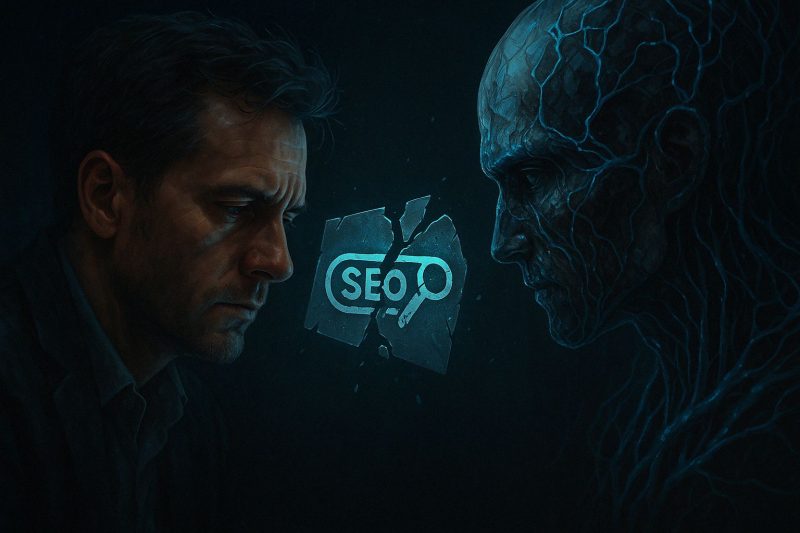Why the future of search isn’t just technical—it’s deeply human.
Welcome to the Algorithm War
Forget rankings. Forget backlinks. Forget the rules you memorized in 2019.
In 2025, AI has stopped being a tool. It’s become a filter. Search engines no longer reward websites for having the “right” answers. They reward those who answer like a mind that understands. And that, more than anything, has flipped SEO on its head.
This is not a trend. It’s a revolution. Changing not just how we optimize, but why we create, what we prioritize, and who we trust.
This guide is not another list of AI tools. It’s a blueprint for adapting your SEO strategy to the most significant shift the industry has ever seen.
1. From Keyword Counts to Neural Networks
SEO once rewarded those who could hack mechanics—titles, metadata, keyword density. Then RankBrain introduced context. BERT made that context conversational. MUM made it visual, multilingual, and multimodal. And now SGE (Search Generative Experience) doesn’t just rank your content. It may replace it altogether.
The game has changed. Completely.
What ranks today isn’t what’s optimized. It’s what’s understood.
And that means you need to stop writing for algorithms and start feeding intelligence into them.
2. AI-Driven SEO in Practice
AI tools aren’t just about scale. They’re about structure. They allow you to build, test, and iterate faster than ever before. But without strategic oversight, they become noise.
✦ Content Creation
Use GPT-4, Claude, or Perplexity to structure articles, reformat long-form pieces, and cluster related topics. But never publish raw output.
Who it’s for: In-house teams producing volume-based content that needs editorial lift
Use smartly: Have humans write intros, conclusions, and examples. Let AI handle scaffolding.
✦ Technical SEO
AI-powered audits (e.g. Sitebulb, Screaming Frog with ML mode) highlight structural issues and crawl barriers in seconds.
Who benefits: Agencies managing multi-domain SEO, e-commerce platforms
Apply it when: You need to prioritize dev tickets, not waste time chasing 404s manually
✦ Semi-Automation
AI tools now handle internal linking, anchor text suggestions, and schema generation.
Use case: SurferSEO auto-links related pages + suggests missing content headers
Caution: Always review. Automation is precision, not permission.
3. Predictive SEO and Trend Forecasting
Predictive SEO uses AI to surface what users will search before they even do.
Using tools like Exploding Topics, MarketMuse, and SEOwind, you can:
- Predict rising questions before “People Also Ask” catches up
- Preemptively build content hubs
- Align seasonal content based on weather, news, or cultural shifts
Example:
A tax software company sees early signals around “AI write-offs for freelance creators” in January, publishes in February, ranks before H&R Block updates their blog.

4. Human-in-the-Loop SEO: When to Let AI Lead and When Not To
AI can structure your thinking, but it can’t replace it.
Let’s say your team is building a product page.
You ask ChatGPT for three CTA variations based on emotion triggers.
You A/B test them in real emails over 30 days.
The highest CTR isn’t the one with the best “wording.” It’s the one with a tone of voice only your brand uses.
Lesson?
Let AI propose. Let humans decide.
Human checkpoints should include:
- Headlines
- Cultural sensitivity
- Storytelling
- CTA placement
- Sentiment and tone
- Editorial authority
That’s the loop. Don’t break it.
5. Algorithmic Ethics and Penalty Zones
Google has made it clear: low-quality, unreviewed AI content will be penalized.
Risks of misuse:
- AI hallucination leading to misinformation
- Factually incorrect advice in YMYL (Your Money Your Life) spaces
- Keyword cannibalization through duplicate cluster output
- Spam flagging from over-optimized programmatic blog builds
Guardrails to implement:
- Editor sign-off for all AI-assisted copy
- Unique insight per article
- Structured attribution
- Sentence-level originality testing (e.g. Copyleaks + human QA)
The future of SEO isn’t “automate everything.” It’s “automate responsibly.”
6. Conversational & Multimodal SEO: Optimize for All Inputs
Google’s MUM can process image, video, and text simultaneously. SGE shows AI summaries before traditional results. This means your content needs to work across modes.
How to optimize multimodally:
- Q&A headers for voice assistants
- Structured content (bullets, bold, TOCs) for SGE snippet formatting
- Visuals with semantic ALT text and schema (ImageObject, VideoObject)
- Video titles that answer full questions:
“How to dispute a credit card charge in Georgia” - Captions and transcriptions aligned with spoken word
- Thumbnails optimized with emotion and clarity
You’re not just ranking anymore. You’re being summarized. Prepare accordingly.
7. Analytics in the Age of Prediction
GA4 + AI overlays now allow for pattern discovery across multiple KPIs.
Metrics that matter most in 2025:
- Scroll velocity
- Engagement trajectory (time until bounce vs. scroll)
- Query diversity (variation by source)
- Session-based content scoring
Use case:
User views blog A → clicks blog B → doesn’t convert → AI flags sequence = low-intent chain → suggest internal linking edit or CTA reposition
You’re not looking at reports anymore. You’re looking at behaviors in motion.
8. Enhanced Technical SEO with AI Precision
AI-assisted platforms like JetOctopus or Deepcrawl now:
- Categorize errors by impact severity
- Predict where UX tweaks will increase conversions
- Automate hreflang audits
- Flag core web vital violations by device and location
Don’t forget:
AI-enhanced doesn’t mean AI-blind. Review all logic outputs.
When a schema tag is misapplied, it can silently break structured data for weeks.
9. Visual Search Optimization: Prepare Now
With Google Lens usage up 37% year over year, image search is now conversion-driven.
Implementation musts:
- Descriptive image file names (e.g. /blue-running-shoes-arch-support.jpg)
- ALT text with intent, not just label
- Caption with value (“Tested by 2,000+ marathoners”)
- Schema: Product + Review markup
- EXIF metadata for original content validation
Search is becoming seeable. Don’t treat visuals like accessories. Treat them like content.
10. AI-Powered Search Engines: The Fragmenting Frontier
While Google dominates, other players like Perplexity AI, You.com, and Andi are fragmenting search attention.
Optimize now by:
- Writing with clarity-first structure
- Creating “instant digestible” content modules
- Publishing short summaries before body copy
- Linking to high-authority sources (for AI citation trust)
These engines don’t rank in the traditional sense. They pull. Make your content easy to pull from.
11. Curated Authority: Doing More with Less
In the age of AI, volume is not value.
Rather than pumping out 100 pages/month, top brands now:
- Curate internal hubs
- Repurpose content across modes
- Use AI to flag gaps, not to fill them blindly
- Invest in depth per page
- Maintain “editorial fingerprints” throughout
Authority isn’t built by length. It’s built by clarity, consistency, and confidence.
12. Your 2025 SEO Stack With Purpose
A list isn’t a strategy. But here’s how your toolkit should look by layer:
Research & Planning
- AlsoAsked (question mapping)
- SEOwind (cluster prediction)
- Exploding Topics (early trend spotting)
Content & Creation
- GPT-4 for structure and outline
- Grammarly or Writer for tone
- Original research to differentiate
Auditing & Technical
- Screaming Frog ML
- Deepcrawl
- JetOctopus with AI categorization
Performance & Feedback
- GA4 + Piwik + AI overlay
- Clarity for heatmap patterning
- SurferSEO or Clearscope (with editorial override)
Don’t forget: The tool doesn’t win. The hand that guides it does.
Final Thoughts: AI Didn’t Kill SEO. It Made It Grow Up
The AI revolution isn’t about replacing humans. It’s about raising the bar.
It demands better content. Deeper strategy. Sharper ethics.
It asks for clarity, speed, and originality—delivered at scale.
But the winners won’t be those with the most automation.
They’ll be the ones who combine machine intelligence with human intention.
This isn’t the death of SEO. It’s the beginning of its maturity.


